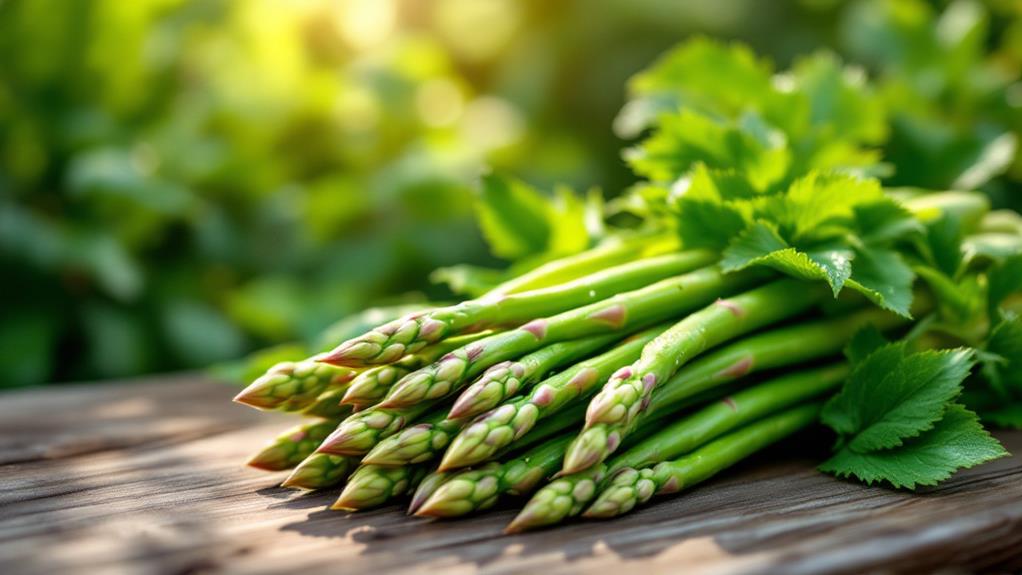A Squash for All Seasons: The Many Varieties and Benefits of Squash

Squash is your all-season veggie hero. From summer's bright zucchini or yellow squash to winter's hearty butternut and acorn varieties, there's no shortage of flavors and uses. Each type offers a unique nutritional profile filled with crucial vitamins like A, C, and B6, plus minerals such as potassium and magnesium. They're great roasted, steamed, or even raw, adding variety to any meal while supporting digestion and heart health. Convenient storage, regardless of being refrigerated or at room temperature, keeps this versatile ingredient fresh. For delicious recipes and further nutritional insights, squash is ready to surprise your taste buds at every turn.
Types of Squash
When exploring the diverse world of squash, you'll encounter two main types: summer squash and winter squash. As you investigate winter squash, you'll find a variety of options, each with unique characteristics and benefits. Among the types of winter squash, acorn squash, butternut squash, and spaghetti squash stand out for their distinct flavors and textures.
Acorn squash, with its ribbed skin and sweet, nutty taste, is perfect for roasting or baking. Butternut squash, known for its smooth texture and mildly sweet flavor, is versatile and can be used in soups or purees. Spaghetti squash is unique with its stringy flesh, making it a low-carb alternative to pasta.
Winter squash offers numerous health benefits of eating. They're high in fiber, which aids digestion and helps maintain a healthy weight. Rich in Vitamin C and beta-carotene, these squashes contribute to reducing oxidative stress and enhancing heart health. The antioxidants in these squashes help combat free radicals, promoting comprehensive wellness. By incorporating different types of winter squash into your diet, you not only enjoy delicious meals but also support your body's health in multiple ways.
Nutritional Benefits
In conjunction with their delightful flavors, squash varieties are nutritional powerhouses, providing a wide range of vital vitamins and minerals that support total health. When you include squash in your diet, you're tapping into a wealth of health benefits. Packed with vitamins A, C, B1, B6, and folate, squash supports important bodily functions. Eating squash raw or cooked can help reduce the risk of chronic diseases. For instance, antioxidants like beta-carotene found in squash are linked to lower risks of cancer and heart disease.
The nutritional benefits of squash don't stop there. Summer and winter squash are excellent potassium sources, with winter squash offering up to 1,000 mg per cup. This mineral is crucial for maintaining healthy blood pressure and heart function. The high fiber content in varieties like Hubbard and acorn squash aids digestion and helps keep blood sugar levels stable.
Moreover, squash contributes to bone health through its calcium, magnesium, and vitamins A and C content, vital for bone density. These nutrients also support eye health, potentially reducing the risk of macular degeneration. So, adding squash to your meals can greatly enhance your comprehensive well-being.
Cooking Techniques

Squash types offer not only nutritional benefits but also a delightful array of cooking possibilities that improve their flavors and textures. Adopt the versatility of these squash types through numerous cooking techniques. Roasting is a surefire way to bring out their natural sweetness. Simply cut, seed, and coat your squash with olive oil and seasonings before baking until it's tender. This method works wonders for butternut squash, turning it into a soft, fiber-rich side dish or a base for creamy soups when pureed with broth and spices.
Spaghetti squash is another favorite, providing a healthy pasta alternative. You can bake or microwave it until the flesh becomes tender, then easily scrape it into noodle-like strands that soak up any sauce you fancy. For summer squash, such as zucchini, enjoy its fresh, crisp flavor raw or uncooked in salads. You can also grate it into fritters, showcasing its versatility in both sweet and savory recipes.
Whether you're steaming, frying, or experimenting with new recipes, squash types provide endless opportunities to improve your meals with their unique textures and flavors. Don't be afraid to investigate these techniques and find your personal favorites.
Storage Tips
Storing squash properly can greatly extend its freshness and usability. To make certain your squash stays in top condition, follow these crucial storage tips.
- Summer Squash: Keep it fresh by refrigerating it as soon as you bring it home. Since summer squash has a softer skin, it's best used within a few days to prevent spoilage. Store it in a single layer to avoid bruising, which can accelerate decay.
- Winter Squash: Thanks to its thick skin, winter squash doesn't need refrigeration. You can store it at room temperature for several weeks. Just make certain it's in a cool, dry place and arranged in a single layer to prevent bruising and spoilage.
- Cut Squash and Seeds: For a longer preservation, cut squash can be cubed or pureed and stored in airtight bags before freezing. This method is perfect for keeping squash ready for future recipes. In addition, roasted squash seeds are a nutritious treat and can be kept fresh for months in an airtight container.
With these storage tips, you'll guarantee your squash is always ready to add flavor and nutrition to your meals, no matter the season.
Health Benefits

Among the many reasons to include squash in your diet, its impressive health benefits stand out. Packed with Vitamins A, C, and B6, squash supports numerous aspects of your well-being. Vitamin A is vital for maintaining good eye health, allowing you to see clearly and avoid vision-related issues. Vitamin C is known for enhancing your immune function, helping you ward off colds and infections. Meanwhile, Vitamin B6 may reduce the risk of depression, contributing to a positive mental outlook.
Squash is also rich in antioxidants, which combat oxidative stress. By doing so, they may lower your risk of chronic diseases, including cancer and heart disease. The high dietary fiber content in squash aids digestion, supports comprehensive gut health, and helps maintain stable glucose levels, making it a smart choice for managing blood sugar.
Moreover, regular consumption of squash supports bone health due to its calcium and vitamin content, vital for maintaining bone density. The potassium and magnesium in squash play key roles in heart health by regulating blood pressure and ensuring normal heart function. Including squash in your meals can make a significant difference in your holistic health.




